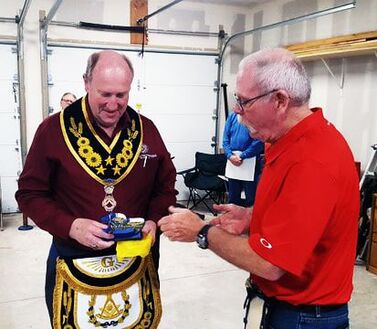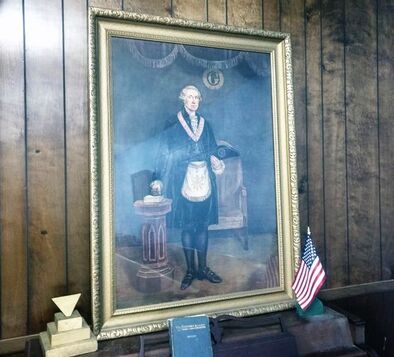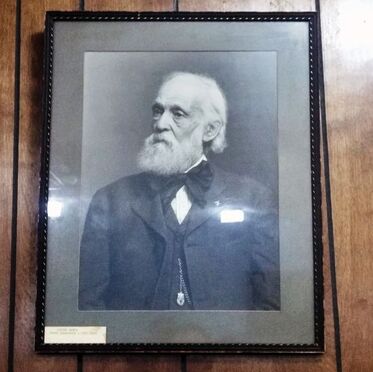Who are the Freemasons?

What is Masonry?
Masonry is Friendship
Masonry is being a friend, sharing common interests, respecting one another, and taking a personal interest in the well-being of others. It’s caring about the men with whom we are associated; in the same way we care about our own family members.
Masonry is Thought and Study
Our purpose is the help each other be better men. We’re serious about that, so, we learn about values and about how they apply to our daily lives: values like honesty in business and in human relations, fairness in work, courtesy in society, compassion for the sick and unfortunate, forgiveness, love for our fell humans, and an abiding faith in God.
And just as importantly, as Masons, we hold ourselves responsible for practicing those values.
Masonry is Responsibility
In a recent national survey, Masons were listed as the most trustworthy single group in America, with a large percentage of the survey agreeing with the statement, “You can trust a member of the Freemasons to deal with you honestly and fairly, no matter what.” That’s flattering, of course, but it’s also an awesome responsibility.
We teach that there is no such thing as being “sort of honest”, or “generally truthful”, or “faithful when it’s important”. A man must be honest, truthful, and faithful. And that means all of the time, both in business and in personal life. Since you can never know the final consequences of any a ct, you must take responsibility for every act.
Masonry is Working and Sharing
We work to help our communities grow and prosper, and to take are of community needs:
Masonry is Generosity
In America, Masons give nearly $2 million a day to help people. In Kansas, it’s nearly $1.5 million a year.
Kansas Masons have donated almost $25 million to KU Cancer Research. We give out more than 150 scholarships to Kansas students going to Kansas institutions. We provide local cancer screening clinics throughout the state for communities that do not have professional health care centers for testing. We provide educational programs to recognize our teachers and outstanding students. We help Brothers – as well as their wives, widows, mothers and children – in time of need. We provide funding for local community charities, through our more than 230 lodges throughout the state.
We work at building a better world for everyone.
Masonry is for Good Men
We do not ask individual men to join Masonry. Our rule is that men must ask us, instead. It’s not that we want to put roadblocks in their way. We believe that a man should seek to become a Mason because he really wants to – not because some friend pressured him into it. But we’re always ready to welcome good men into the Fraternity. And if you are a man who believes in honor and integrity, in the importance of individual responsibility and personal freedom, in fellowship and community service and “fraternity”, then you may well find as much joy and reward in Masonry as we do. We welcome you to ask us for information about membership. It could be one of the best decisions you ever make.
Masonry is Leadership
We are proud of the contributions Masonry has made to the world. Fifteen Presidents of the United States have been Masons, including George Washing, Eighteen Vice Presidents and five Chief Justices of the Supreme Court have also been Masons.
There are many other famous Masons: Musicians like Mozart and Irving Berlin; Statesmen like Benjamin Franklin and John Hancock; Sportsmen like Arnold Palmer; Religious leaders like the Reverend Norman Vincent Peals; Political leaders like Senator Bob Dole; Basketball legend Shaquille O’Neal; Football great John Elway; Country music favorite Brad Pasley, Actor Brad Pitt; AppleCo-Founder Steve Wozniak and many many more…it’s a long list.
Masonry is Friendship
Masonry is being a friend, sharing common interests, respecting one another, and taking a personal interest in the well-being of others. It’s caring about the men with whom we are associated; in the same way we care about our own family members.
Masonry is Thought and Study
Our purpose is the help each other be better men. We’re serious about that, so, we learn about values and about how they apply to our daily lives: values like honesty in business and in human relations, fairness in work, courtesy in society, compassion for the sick and unfortunate, forgiveness, love for our fell humans, and an abiding faith in God.
And just as importantly, as Masons, we hold ourselves responsible for practicing those values.
Masonry is Responsibility
In a recent national survey, Masons were listed as the most trustworthy single group in America, with a large percentage of the survey agreeing with the statement, “You can trust a member of the Freemasons to deal with you honestly and fairly, no matter what.” That’s flattering, of course, but it’s also an awesome responsibility.
We teach that there is no such thing as being “sort of honest”, or “generally truthful”, or “faithful when it’s important”. A man must be honest, truthful, and faithful. And that means all of the time, both in business and in personal life. Since you can never know the final consequences of any a ct, you must take responsibility for every act.
Masonry is Working and Sharing
We work to help our communities grow and prosper, and to take are of community needs:
- Working together in cooperation and harmony
- Applying our own individual talents and skills to the task at hand
- Sharing our time for the welfare of the community, state, and country
Masonry is Generosity
In America, Masons give nearly $2 million a day to help people. In Kansas, it’s nearly $1.5 million a year.
Kansas Masons have donated almost $25 million to KU Cancer Research. We give out more than 150 scholarships to Kansas students going to Kansas institutions. We provide local cancer screening clinics throughout the state for communities that do not have professional health care centers for testing. We provide educational programs to recognize our teachers and outstanding students. We help Brothers – as well as their wives, widows, mothers and children – in time of need. We provide funding for local community charities, through our more than 230 lodges throughout the state.
We work at building a better world for everyone.
Masonry is for Good Men
We do not ask individual men to join Masonry. Our rule is that men must ask us, instead. It’s not that we want to put roadblocks in their way. We believe that a man should seek to become a Mason because he really wants to – not because some friend pressured him into it. But we’re always ready to welcome good men into the Fraternity. And if you are a man who believes in honor and integrity, in the importance of individual responsibility and personal freedom, in fellowship and community service and “fraternity”, then you may well find as much joy and reward in Masonry as we do. We welcome you to ask us for information about membership. It could be one of the best decisions you ever make.
Masonry is Leadership
We are proud of the contributions Masonry has made to the world. Fifteen Presidents of the United States have been Masons, including George Washing, Eighteen Vice Presidents and five Chief Justices of the Supreme Court have also been Masons.
There are many other famous Masons: Musicians like Mozart and Irving Berlin; Statesmen like Benjamin Franklin and John Hancock; Sportsmen like Arnold Palmer; Religious leaders like the Reverend Norman Vincent Peals; Political leaders like Senator Bob Dole; Basketball legend Shaquille O’Neal; Football great John Elway; Country music favorite Brad Pasley, Actor Brad Pitt; AppleCo-Founder Steve Wozniak and many many more…it’s a long list.

Where did Freemasonry come from?
Freemasonry is the largest and oldest fraternity in the world. No one knows just how old freemasonry is because the origins have been lost to time. We believe it arose from the ancient stonemasons’ guilds formed by the builders of the great cathedrals and castles of the Middle Ages.
In the Middle Ages, the term “freemason” referred to highly skilled stonemasons who were hired as free agents to build castles and cathedrals in England and Scotland. Because of the inherent danger of their work, many stonemasons formed local organizations, called guilds or lodges, to take care of sick and injured members, as well as of the widows and orphans of those who were killed on the job They also used lodges as places to meet, receive their pay, plan their work, train new apprentices, and socialize. Since there were originally used to prove a man was a member of the lodge and to help protect the trade secrets of the stonemasons’ craft.
Gradually, the stonemasons accepted other selected gentlemen into the brotherhood, and it evolved from a labor guild to a fraternity. In 1717, the Freemasons formally organized as a fraternal group in London, established their first governing body, and called it a Grand Lodge. Within the next 20 years, Freemasonry spread throughout Europe and made its way to the American colonies. In 1733, the first American Grand Lodge was established in Boston. Many of our Founding Fathers were among the first Masons in America.
Freemasonry is the largest and oldest fraternity in the world. No one knows just how old freemasonry is because the origins have been lost to time. We believe it arose from the ancient stonemasons’ guilds formed by the builders of the great cathedrals and castles of the Middle Ages.
In the Middle Ages, the term “freemason” referred to highly skilled stonemasons who were hired as free agents to build castles and cathedrals in England and Scotland. Because of the inherent danger of their work, many stonemasons formed local organizations, called guilds or lodges, to take care of sick and injured members, as well as of the widows and orphans of those who were killed on the job They also used lodges as places to meet, receive their pay, plan their work, train new apprentices, and socialize. Since there were originally used to prove a man was a member of the lodge and to help protect the trade secrets of the stonemasons’ craft.
Gradually, the stonemasons accepted other selected gentlemen into the brotherhood, and it evolved from a labor guild to a fraternity. In 1717, the Freemasons formally organized as a fraternal group in London, established their first governing body, and called it a Grand Lodge. Within the next 20 years, Freemasonry spread throughout Europe and made its way to the American colonies. In 1733, the first American Grand Lodge was established in Boston. Many of our Founding Fathers were among the first Masons in America.
Qualifications:
In order to be considered for membership in the Masonic Fraternity you must meet the following criteria:
In order to be considered for membership in the Masonic Fraternity you must meet the following criteria:
- Be a male
- Be at least 18 years old
- Profess a belief in God
- Support local and national government and abide by the laws and Constitution of the United States
- Not be engaged in illegal activities
- Have a good reputation in the community

Freemasonry in Kansas
Today there are more than 19,000 Masons who belong to the 231 Lodges across the entire state of Kansas. While they serve a different purpose than when Masonry was founded in the Middle Ages, its mission and the principles are still the same.
Our mission is guided by the enduring principles of our fraternity – brotherly love, relief and truth – and our core values which are these:
The Grand Lodge of Kansas is the governing body of Freemasonry in Kansas, form March 17, 1856, nearly five years before Kansas saw statehood. Bleeding Kansas, the prelude to America’s Civil War, provided the backdrop to Kansas Freemasonry.
In 1854, three Wyandot Indians and give white settlers – all of whom were Masons – came together in what is now Wyandotte County, Kansas, and petitioned the Grand Lodge of Missouri to establish a Lodge of Masons in a Wyandot Indian village. On August 4, 1854, the dispensation was granted and one week later, Kansas Lodge UD began its work. Within two years, two other lodges in Kansas were formed, and in 1856, the trio formed the Grand Lodge of Kansas, as America’s Civil War loomed.
Notably the first Master of Kansas Lodge UD was John Chivington, a Methodist missionary to the Wyandot and a vocal opponent of slavery. Chivington left Kansas in 1860, became an office in the Union Army, and was later celebrated as a hero for his part in the Battle of Glorieta Pass (1862). His orchestration of the Sand Creek Massacre (1864), however, earned him universal condemnation and ultimately made him infamous.
The influence of Missouri masonry in Kansas sometimes resulted in curious situations. In the bloody 1850’s and the years of the Civil War (1861-1865), Kansas was continually torn by bitter strife over slavery, with members of the two factions hunting down and slaying each other. Yet, whenever enough Brethren, regardless of faction, could be found, they eagerly stood their guns against the nearest tree and began the erection of a Masonic Altar. Enemies by day, they met as Brothers at night.
Today there are more than 19,000 Masons who belong to the 231 Lodges across the entire state of Kansas. While they serve a different purpose than when Masonry was founded in the Middle Ages, its mission and the principles are still the same.
Our mission is guided by the enduring principles of our fraternity – brotherly love, relief and truth – and our core values which are these:
- Ethics, embodied by leading lives based on honor and integrity
- Tolerance for religious, ethnic, cultural, social and educational differences
- Personal growth through continuous pursuit of knowledge
- Philanthropy through charitable giving and community service
- Veneration of family
- Respect for individual Freedom
The Grand Lodge of Kansas is the governing body of Freemasonry in Kansas, form March 17, 1856, nearly five years before Kansas saw statehood. Bleeding Kansas, the prelude to America’s Civil War, provided the backdrop to Kansas Freemasonry.
In 1854, three Wyandot Indians and give white settlers – all of whom were Masons – came together in what is now Wyandotte County, Kansas, and petitioned the Grand Lodge of Missouri to establish a Lodge of Masons in a Wyandot Indian village. On August 4, 1854, the dispensation was granted and one week later, Kansas Lodge UD began its work. Within two years, two other lodges in Kansas were formed, and in 1856, the trio formed the Grand Lodge of Kansas, as America’s Civil War loomed.
Notably the first Master of Kansas Lodge UD was John Chivington, a Methodist missionary to the Wyandot and a vocal opponent of slavery. Chivington left Kansas in 1860, became an office in the Union Army, and was later celebrated as a hero for his part in the Battle of Glorieta Pass (1862). His orchestration of the Sand Creek Massacre (1864), however, earned him universal condemnation and ultimately made him infamous.
The influence of Missouri masonry in Kansas sometimes resulted in curious situations. In the bloody 1850’s and the years of the Civil War (1861-1865), Kansas was continually torn by bitter strife over slavery, with members of the two factions hunting down and slaying each other. Yet, whenever enough Brethren, regardless of faction, could be found, they eagerly stood their guns against the nearest tree and began the erection of a Masonic Altar. Enemies by day, they met as Brothers at night.
